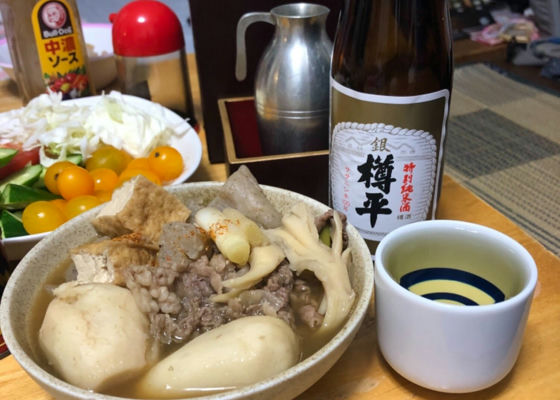
ヒラッチョ
It has the aroma of a barrel brew, with a unique flavor, acidity, richness, and a simple umami taste that warms up and is a wonderful match for Imoni.
It has a lot of character. It's unique. It's the opposite of what's popular.
It's not for beginners, but for people who like Kikuhime's Yamahai Junmai.
Along with the sake, I picked up most of the ingredients for the imoni at the Yamagata Prefecture antenna shop in Yurakucho today. Taro, beef, leeks, konnyaku, deep-fried tofu, and marjus.
Every year I have to decide whether to make imoni Shonai-style (pork, miso, and thick fried tofu) or Inland-style (beef and soy sauce), even though they are both from Yamagata Prefecture. Sometimes I make both, one at a time.
Noting that Yoshiharu Doi's taro stew recipe is seasoned with miso and soy sauce, this time I added thick fried tofu and tried an eclectic recipe of Shonai and Inland regions.
I proceeded with the basic miso and finished with soy sauce.
Ajimarujuu is a perfect match for the flavors.
Japanese>English
遥瑛チチ
Hi Hilacchio,Good evening🌆
I'm so glad I found you!
I'm not sure if I'll be able to make it.
Japanese>English
honda
Hi Hilacchio-san, Good evening🌠
Thank you for the recipe of Shonai-style sweet potato stew 😉 You season it with miso ✨.
I'll try it next time. I'll try to make it next time😃.
Japanese>English
ヒラッチョ
Good morning, Haruei Chichi.
This is the first time I made an eclectic dish.
The beef, the taste is marju, and the taste is more inland.
Like curry, the type of meat changes the flavor of the dish.
Japanese>English
ヒラッチョ
Good morning, honda.
I'm sure you've heard of it.
I'm sure you'll be able to find something that suits you.
Japanese>English